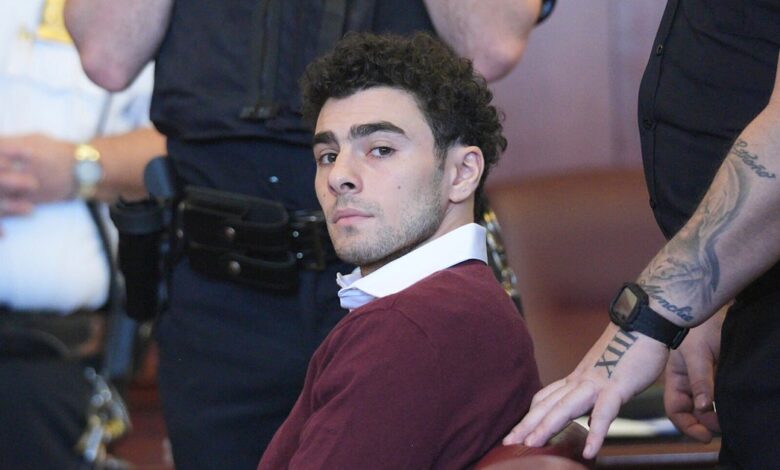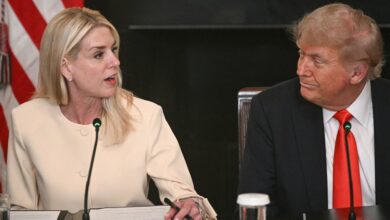Luigi Mangione’s Handwritten Journal Sheds New Light On His State Of Mind

Luigi Mangione, the 27-year-old accused in the brazen shooting death of United HealthCare CEO Brian Thompson, had allegedly solidified his intention to make a statement about American health care by August 15 of last year.
On that day, he purportedly penned in a red notebook, “I finally feel confident about what I will do. The details are coming together. And I don’t feel any doubt about whether it’s right/justified.”
“I’m glad — in a way — that I’ve procrastinated because it allowed me to learn more about UHC.”
Prosecutors revealed selected handwritten pages of a journal used by Mangione in a new 82-page filing on Wednesday that provides insight into the contemplation he put into the alleged crime, including an analysis of how it would be perceived by the public.
Mangione also seems to have contemplated a different target — someone with the initials “KMD” — before ultimately dismissing the idea.
“KMD would’ve been an unjustified catastrophe that would be perceived mostly as sick, but more importantly unhelpful. Would do nothing to spread awareness/improve people’s lives,” Mangione allegedly wrote. “The target is insurance. It checks every box.”
On October 22, about one-and-a-half months before Thompson’s death, Mangione purportedly wrote that “the problem with most revolutionary acts is that the message is lost on normies.”
“For example, Ted K makes some good points on the future of humanity, but to make his point he indiscriminately mailbombs innocents,” Mangione allegedly wrote, referencing the Unabomber, Ted Kaczynski. Mangione had previously left a Goodreads review on Kaczynski’s book, “Industrial Society and Its Future,” stating it was “impossible to ignore how prescient many of his predictions about modern society turned out.”
The journal entry continued: “Normies categorize him as an insane serial killer, focus on the act/atrocities themselves, and dismiss his ideas. And most importantly — by committing indiscriminate atrocities he becomes a monster, which makes his ideas those of a monster, no matter how true. He crosses the line from revolutionary anarchist to terrorist — the worst thing a person can be.”
“This is the problem with most militants that rebel against — often real — injustices: they commit an atrocity whose horror either outweighs the impact of their message, or whose distance from their message prevents normies from connecting the dots,” the entry said. “Consequently, the revolutionary idea becomes associated with extremism, incoherence or evil — an idea that no reasonable member of society could approve of. Rather than win public support, they lose it. The revolutionary actions are actively counter-productive.”
Mangione, who allegedly referred to himself as a “revolutionary anarchist” in the notebook, has garnered support across the country from Americans disenchanted with exorbitantly expensive U.S. health care.
The court filing discloses that Mangione seemed to have crossed paths with Thompson the day before the shooting, as he appeared to be talking on his cell phone while strolling down a Manhattan street near Thompson’s hotel.
Mangione purportedly spent approximately 23 minutes waiting outside the hotel on Dec. 4 before spotting Thompson. A figure clad in black with a backpack is captured in security footage swiftly approaching the CEO from behind and firing several quick shots before fleeing the scene.
A large-scale manhunt concluded five days later when Mangione was sighted at a McDonald’s in Altoona, Pennsylvania. The notebook was among the items he allegedly had in his possession at the time of his apprehension.
Prosecutors argued in the filing for a terrorism enhancement if or when Mangione is convicted, asserting that Thompson’s murder was orchestrated to instill fear in those who profit immensely from U.S. health care.
They provided instances of the aftermath: some United HealthCare employees purportedly resigned out of fear of reprisal, many received security details, and one executive changed her appearance and relocated due to threats. Some UHC employees were hesitant to send out letters denying coverage, successfully petitioning the company to allow them to keep their names off the letters despite certain state laws that mandate them to do so.
They also refuted the suggestion outlined in the notebook that limiting the scope of violence to one symbolic person was morally justifiable.
“You don’t get a trophy or any kind of absolution under New York’s anti-terrorism law because you only killed one innocent person and not others,” prosecutors stated.





